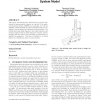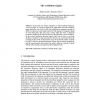138 search results - page 16 / 28 » Evolved Neurodynamics for Robot Control |
GECCO
2007
Springer
14 years 5 months ago
2007
Springer
The problem of how to acquire a model of a physical robot, which is fit for evolution of controllers that can subsequently be used to control that robot, is considered in the con...
GECCO
2008
Springer
13 years 12 months ago
2008
Springer
This paper demonstrates the effectiveness of genetic algorithms in training stable behavior in a model of the spinoneuromuscular system (SNMS). In particular, we test the stabili...
CEC
2010
IEEE
14 years 18 hour ago
2010
IEEE
For any embodied, mobile, autonomous agent it is essential to control its actuators appropriately for the faced task. This holds for natural organisms as well as for robots. If sev...
CEC
2009
IEEE
14 years 5 months ago
2009
IEEE
— Legged robots show promise for complex mobility tasks, such as navigating rough terrain, but the design of their control software is both challenging and laborious. Traditional...
ECAL
2007
Springer
14 years 5 months ago
2007
Springer
We describe two simple simulations in which artificial organisms evolve an ability to respond to inputs from within their own body and these inputs themselves can evolve. In the fi...


